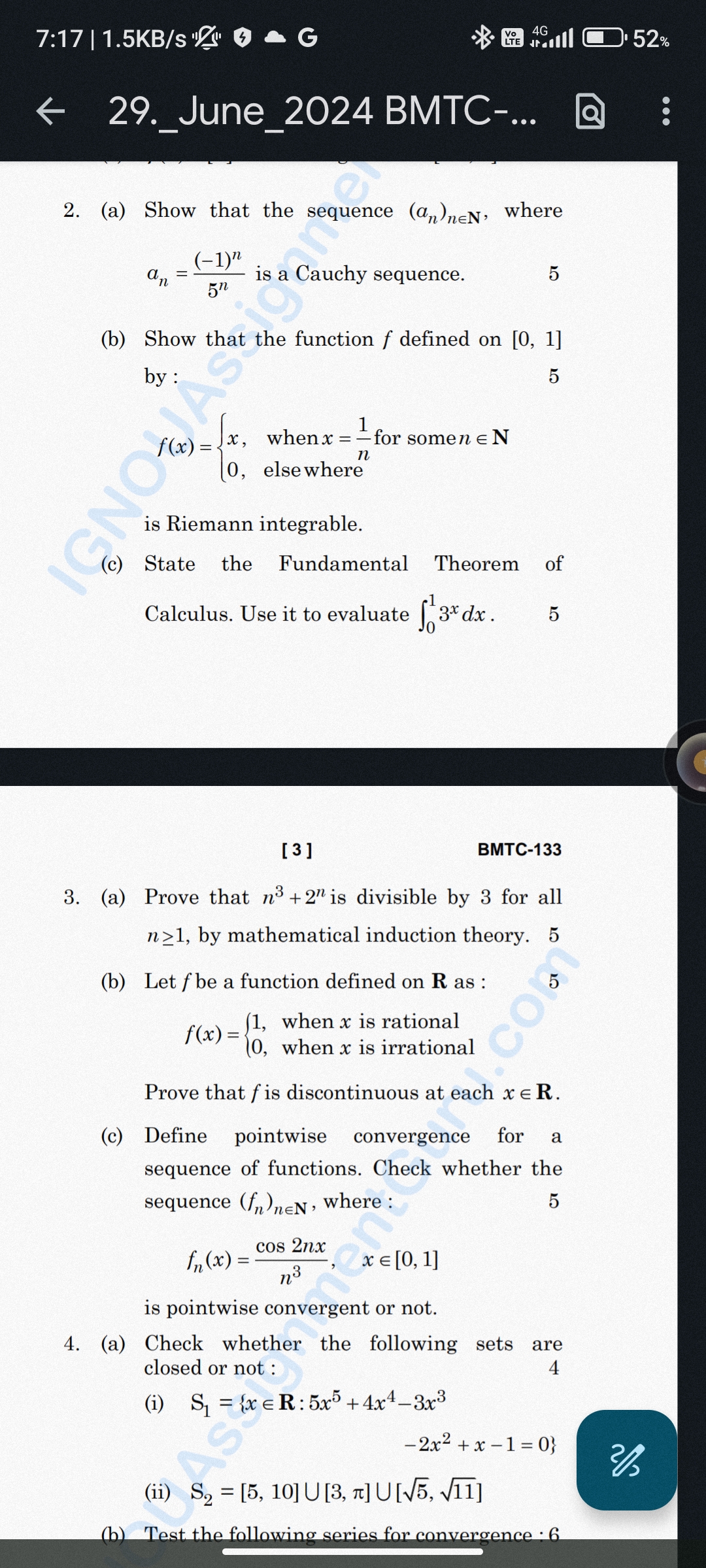2. (a) Show that the sequence (an)n∈N, where an = (-1)^n / 5^n is a Cauchy sequence. (b) Show that the function f defined on [0, 1] by f(x) = x, when x = 1/n for some n ∈ N; 0, els... 2. (a) Show that the sequence (an)n∈N, where an = (-1)^n / 5^n is a Cauchy sequence. (b) Show that the function f defined on [0, 1] by f(x) = x, when x = 1/n for some n ∈ N; 0, elsewhere is Riemann integrable. (c) State the Fundamental Theorem of Calculus. Use it to evaluate ∫0^1 3x dx. 3. (a) Prove that n^3 + 2n is divisible by 3 for all n ≥ 1, by mathematical induction. (b) Let f be a function defined on R as: f(x) = 1, when x is rational; 0, when x is irrational. Prove that f is discontinuous at each x ∈ R. (c) Define pointwise convergence for a sequence of functions. Check whether the sequence (fn)n∈N, where fn(x) = cos(2nx^3)/n^3, x ∈ [0, 1] is pointwise convergent or not.

Understand the Problem
The question contains multiple parts related to mathematical concepts such as sequences, integrability, and continuity. It asks to prove properties of sequences and functions, evaluate integrals, and explore pointwise convergence.
Answer
The Cauchy sequence \( a_n = \frac{(-1)^n}{5^n} \) converges, \( f(x) \) is Riemann integrable, and \( \int_0^1 3x \, dx = \frac{3}{2} \).
Answer for screen readers
The sequence ( a_n = \frac{(-1)^n}{5^n} ) is a Cauchy sequence. The function ( f(x) ) is Riemann integrable, and the integral evaluates to ( \frac{3}{2} ).
Steps to Solve
-
Show that the sequence is Cauchy To prove that the sequence ( a_n = \frac{(-1)^n}{5^n} ) is a Cauchy sequence, we need to show that for every ( \epsilon > 0 ), there exists ( N ) such that for all ( m, n \geq N ), the inequality ( |a_n - a_m| < \epsilon ) holds.
-
Evaluate ( |a_n - a_m| ) Calculate the difference: [ |a_n - a_m| = \left| \frac{(-1)^n}{5^n} - \frac{(-1)^m}{5^m} \right| ] This can be rewritten using a common denominator: [ = \left| \frac{(-1)^n 5^m - (-1)^m 5^n}{5^{n+m}} \right| ]
-
Simplify the expression Factor the numerator: [ = \frac{1}{5^{n+m}} \left| (-1)^n 5^m - (-1)^m 5^n \right| ] Estimate the absolute value. Notice that ( |(-1)^n 5^m - (-1)^m 5^n| \leq 5^m + 5^n \leq 2 \cdot 5^{\max(n,m)} ).
-
Find ( N ) based on ( 5^n ) We want: [ \frac{2 \cdot 5^{\max(n,m)}}{5^{n+m}} < \epsilon ] This leads to: [ 2 < \epsilon \cdot \frac{5^{n+m}}{5^{\max(n,m)}} ] Choose ( N ) such that ( \frac{5^{n+m}}{5^{\max(n,m)}} ) becomes large enough to satisfy the above condition as ( n ) and ( m ) increase.
-
Conclusion Since the sequence converges to 0, it is a Cauchy sequence.
-
Show Riemann Integrability To determine the Riemann integrability of the function ( f(x) ), note that it only takes the value ( x ) at countably infinite points (i.e., ( \frac{1}{n} )), and ( 0 ) elsewhere. Since the set of discontinuities is countable, the function is Riemann integrable.
-
Use the Fundamental Theorem of Calculus To evaluate the integral ( \int_0^1 3x , dx ): First, find the antiderivative: [ F(x) = \frac{3x^2}{2} ] Apply the limits: [ \int_0^1 3x , dx = F(1) - F(0) = \frac{3(1)^2}{2} - 0 = \frac{3}{2} ]
The sequence ( a_n = \frac{(-1)^n}{5^n} ) is a Cauchy sequence. The function ( f(x) ) is Riemann integrable, and the integral evaluates to ( \frac{3}{2} ).
More Information
The sequence converges to 0 and demonstrates the Cauchy criterion for convergence. The Riemann integrability of ( f(x) ) is tied to the nature of its discontinuities, being countable. The integral ( \int_0^1 3x , dx ) illustrates practical application of the Fundamental Theorem of Calculus.
Tips
Some common mistakes when establishing that a sequence is Cauchy include:
- Failing to consider the requirements for ( \epsilon ).
- Not simplifying the expression correctly.
- Not realizing that both ( n ) and ( m ) increasing affects convergence.
AI-generated content may contain errors. Please verify critical information